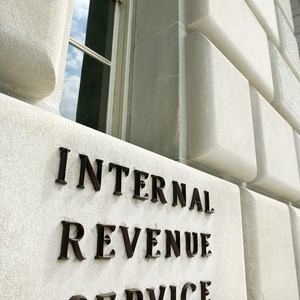
If you inherited real estate, you may become liable for two types of taxes -- capital gains tax and estate tax. In most cases, the heir of the deceased taxpayer's estate will be liable for at least one of these two taxes. Even if not, you will still be required to report the sale of the property to the IRS.
Capital Gains Tax
The IRS levies a capital gains tax when you purchase property, sell it later and make a profit from the property's appreciation in value. The amount of the capital gains tax varies based on the year the property is sold, the length of time you owned it before selling it and your taxable income. Capital gains tax rates are as low as zero and as high as 20 percent.
Basis
Your income from a capital gain is the amount of the sales price minus the basis of the property. Normally, the basis of the property is the price you paid for it. If you inherited real property, however, the basis will be the fair market value of the property on the date of death of the person you inherited it from. This allows you to avoid paying taxes on the property while it was owned by someone else.
Schedule D
Schedule D is an appendix to form 1040, and you must use it to report capital gains. You must calculate the property's basis and keep records to justify your calculation in case of an IRS audit. You must also classify your capital gain as short-term or long-term because this can affect the tax rate. A capital gain is long-term if you held it for more than one year before selling it but is always long-term if you inherited it from a taxpayer who died before 2010. The date of your acquisition is the date the property was actually awarded to you, not the date of the taxpayer's death.
Estate Tax
Estate tax is levied on the estate of a deceased taxpayer when it exceeds the estate tax exclusion. For taxpayers dying in 2011, the exclusion was $1 million, and the estate tax rate was 55 percent. If the estate is liable for estate tax, the executor may be forced to sell real property to raise the money to pay the estate tax. In this case, the executor, rather than the heir, must file Schedule D on behalf of the estate, along with IRS form 706 to pay estate tax. Since the property is sold before probate is closed, the amount of appreciation, and thus the amount of capital gains tax, is likely to be less than if the property was inherited by an heir and sold later.
References
- IRS.gov; Publication 544; Sales and Other Dispositions of Assets
- "NYDailyNews.com"; What to Expect When You're Due to Inherit Real Estate; September 2008
- IRS.gov: Instructions for Schedule D
- The Tax Foundation. "2020 Tax Brackets," Accessed Nov. 27, 2019.
- Internal Revenue Service. "IRS Provides Tax Inflation Adjustments for Tax Year 2020," Accessed Nov. 27, 2019.
Writer Bio
David Carnes has been a full-time writer since 1998 and has published two full-length novels. He spends much of his time in various Asian countries and is fluent in Mandarin Chinese. He earned a Juris Doctorate from the University of Kentucky College of Law.

